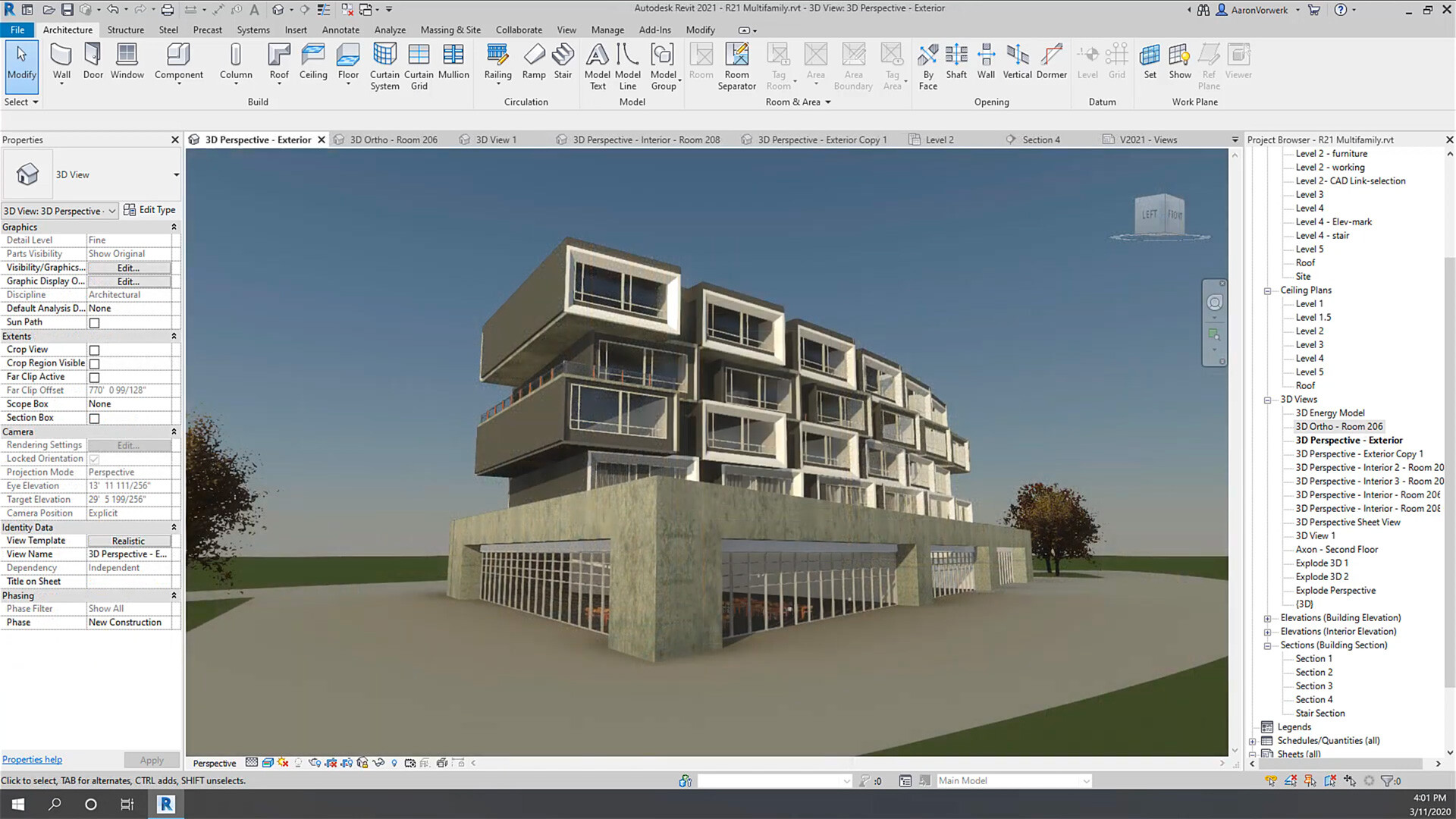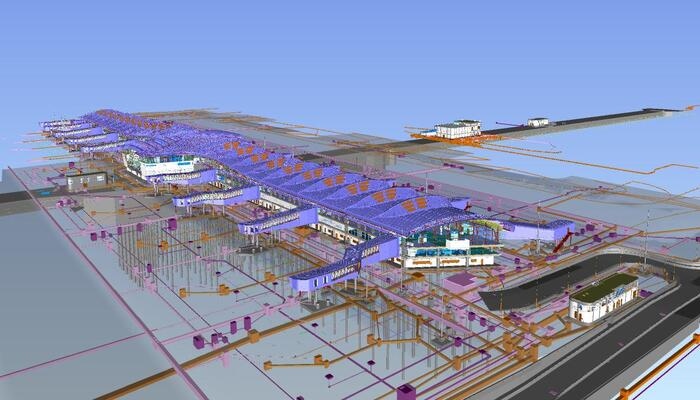In Demand Jobs and Salaries using BIM Expertise in Civil Engineering (2025)

Table of Contents
Building Information Modeling (BIM) has revolutionised BIM in civil engineering and transformed the way construction projects are planned, designed, constructed, and managed. BIM is a digital representation of a building or infrastructure's physical and functional characteristics throughout its entire lifecycle. BIM is highly beneficial in encompassing geometry, spatial relationships, geographic information, and various data elements to create a comprehensive and collaborative model that provides valuable insights and aids decision-making at every stage of a project.
BIM is a digital model that encompasses a structure's physical dimensions, functional properties, and characteristics. It encourages collaboration among stakeholders, covers the entire lifecycle, and provides realistic 3D visualisations. BIM incorporates data like cost, time, performance, and sustainability- supporting informed decision-making and avoiding costly revisions. It also helps with accurate quantity take-offs and cost estimations, improving project budget accuracy and reducing unexpected expenses. BIM models can also be used for facility management, maintenance scheduling, asset tracking, and energy analysis, ensuring compliance with regulations and standards.
BIM aids sustainability analysis by evaluating energy consumption, environmental impact, and other factors, promoting collaboration, improving project outcomes, reducing errors, and enhancing efficiency. It integrates data, enhances visualisation, and supports decision-making throughout the project lifecycle.
To learn more about BIM and implementing it at your firm? Check out: Top 7 Places to Learn BIM in India

BIM Job Roles & Responsibilities for Civil Engineers
A variety of specialised job possibilities have been introduced by building information modeling (BIM) into the civil engineering industry. These professions cover a wide range of bim jobs which helps in implementing building projects effectively by the use of BIM technology. These bim jobs can vary depending on the organisation and the specific project requirements. Here are some common BIM civil engineering jobs and approximate bim salary ranges in India. Salaries can vary significantly based on factors such as location, experience, and company size.
1. BIM Coordinator/Manager
The BIM Coordinator/Manager manages the BIM process, ensuring collaboration among project teams, managing modeling, data exchange, conflict resolution, and maintaining project schedules.
Experience: A bachelor's degree in Architecture, Engineering, and Construction Management, 5+ years of BIM coordination and management experience, proficiency in BIM software, strong construction process understanding, and excellent communication and leadership skills.
Roles and responsibilities
- Oversee BIM implementation and standards.
- Coordinate with stakeholders for BIM execution.
- Manage BIM models and clash detection.
- Develop BIM workflows and protocols.
Salary Range: ₹5,00,000 - ₹10,00,000
2. BIM Modeler/Technician
The BIM Modeler/Technician creates detailed 3D models using design and engineering documents, ensuring an accurate representation of building components, systems, and materials within BIM software.
Experience: The candidate should hold an Associate's degree in Architecture, Engineering, or a related field, 2+ years of experience in BIM modeling, proficiency in 3D modeling, and construction knowledge.
Roles and responsibilities
- Create and develop 3D BIM models.
- Incorporate design changes into the model.
- Ensure accurate representation of project components.
- Collaborate with engineers and architects.
Salary Range: ₹3,00,000 - ₹6,00,000
3. BIM Engineer
The BIM Engineer integrates engineering knowledge with BIM expertise to optimise building system performance and efficiency in a virtual model, working closely with design and construction teams.
Experience: A Bachelor's degree in Engineering, 3+ years of experience in BIM coordination, proficiency in BIM software, and a strong understanding of building systems and MEP coordination.
Roles and responsibilities
- Analyse and resolve clashes within BIM models.
- Collaborate with disciplines to resolve design issues.
- Generate clash reports and documentation.
Salary Range: ₹3,50,000 - ₹7,00,000
4. BIM Specialist
A BIM Specialist is a specialist with specialised knowledge in areas like visualisation, sustainability analysis, or clash detection, enhancing the BIM process and project outcomes.
Experience: A Bachelor's degree in Architecture, Engineering, or a related field, 4+ years of BIM-related experience, proficiency in software, strong problem-solving skills, and innovation ability.
Roles and responsibilities
- Focus on a specific BIM discipline (structural, mechanical, etc.).
- Develop and manage discipline-specific BIM models.
- Coordinate with other specialists.
Salary Range: ₹4,00,000 - ₹8,00,000
5. BIM Project Manager
The BIM Project Manager is responsible for implementing BIM on specific projects, collaborating with stakeholders to ensure standards are met, data is effectively managed, and project objectives are achieved.
Experience: A Bachelor's degree in Construction Management, Architecture, Engineering, or related field, 6+ years of project management experience, strong knowledge of BIM processes, standards, and software, and excellent organisational and communication skills.
Roles and responsibilities
- Manage BIM implementation on projects.
- Collaborate with stakeholders for project goals.
- Monitor project progress and BIM standards.
- Oversee BIM-related documentation.
Salary Range: ₹6,00,000 - ₹12,00,000
6. BIM Analyst
The BIM Analyst analyses BIM data to identify trends, insights, and process improvements, aiding teams in making informed decisions based on data-driven analysis.
Experience: A bachelor's degree in Architecture, Engineering, or Construction Management, 3+ years of BIM experience, data analysis proficiency, data visualisation skills, and strong analytical and problem-solving skills required.
Roles and responsibilities
- Analyse BIM data for performance and cost.
- Generate reports based on BIM analysis.
- Assist in design and construction decisions.
Salary Range: ₹3,50,000 - ₹7,00,000
7. BIM Educator/Trainer
The BIM Educator/Trainer educates professionals and teams on BIM concepts, software usage, and best practices, designing and delivering training programs to enhance BIM skills within an organisation.
Experience: A bachelor's degree in Architecture, Engineering, Construction Management, or a related field, 4+ years of BIM modeling experience, proven teaching or training experience, and excellent communication and presentation skills.
Roles and responsibilities
- Train teams on BIM software and workflows.
- Develop training materials and resources.
- Provide technical support to BIM users.
Salary Range: ₹3,00,000 - ₹6,00,000
8. BIM Consultant
The BIM Consultant offers expert guidance on implementing BIM in projects, including technology selection, process optimisation, and strategy to enhance project outcomes.
Experience: A professional with a Bachelor's or Master's degree in Architecture, Engineering, or Construction Management, 7+ years of BIM-related experience, and in-depth knowledge of standards, software, and industry trends.
Roles and responsibilities
- Provide expert advice on BIM implementation.
- Assist clients in adopting BIM technologies.
- Offer guidance on BIM-enabled project management.
Salary Range: ₹4,00,000 - ₹8,00,000
Factors Influencing BIM Salary Variations
When it comes to determining salary variations in BIM civil engineering jobs, several factors come into play. Of these factors, experience, location, and company size are particularly significant. Professionals need to consider these factors when negotiating salaries or making career decisions. Conducting research on industry standards, networking with others, and seeking guidance from mentors can assist individuals in gaining a better understanding of the BIM salary in India.
1. Experience
Salary is influenced greatly by experience. Generally, people with more years of experience tend to earn higher salaries because they possess increased expertise and add more value to the organisation. At the entry level, individuals who are new to the job role or industry typically start with lower salaries. They may have limited practical experience, but they are eager to learn and contribute to the organisation.
As professionals gain experience and demonstrate their skills, they become more valuable to employers. They have increased responsibilities and proven track records, which leads to higher salaries at the mid-level. Professionals with extensive experience, specialised skills, and the ability to lead projects or teams command the highest salaries at the senior level. Their expertise and knowledge in solving complex problems make them essential assets to the organisation.
2. Location
The location of a job greatly affects salary because of varying costs of living, market demand, and local economic conditions. BIM civil engineering jobs have different salary ranges in different regions or cities. Metropolitan areas with high living costs and high demand for skilled professionals usually offer higher salaries to attract and keep talent. Rural areas with lower living costs and less competition for skilled workers may offer lower salaries for the same job role.
3. Company size
BIM Salary variations are influenced by the size of the company or organisation. Different company sizes have varying budgets, organisational structures, and resource allocation strategies that impact the amount they can afford to pay their employees. For large corporations, they usually have more resources and revenue, enabling them to provide competitive salaries to attract top talent. They may also offer additional benefits and perks. Medium-sized companies may also offer competitive salaries but their budget may be more limited than larger corporations. On the other hand, small companies and startups may initially offer lower salaries due to tighter budgets. However, they may compensate for this by providing other benefits such as flexibility, equity, or growth opportunities.
Trends Shaping BIM Job Roles for Civil Engineers

Building Information Modeling (BIM) is constantly evolving, and several emerging trends are shaping the future of BIM jobs for civil engineers. These trends reflect advancements in technology, changes in project methodologies, and the growing importance of sustainability and data-driven decision-making. Here are some of the key trends influencing the future of BIM civil engineering jobs:
- Digital Twins and Lifecycle Management- It creates a virtual replica of a physical asset or system. This is becoming more prevalent, allowing BIM for civil engineers to monitor and manage the entire lifecycle of a building or infrastructure project in real-time. BIM Jobs might involve continuous monitoring, maintenance optimisation, and data analysis to ensure efficient operations and identify areas for improvement.
- Cloud-Based Collaboration and Remote Work- Cloud technology is transforming how BIM professionals collaborate on projects. Remote work and collaboration have become more feasible, enabling BIM for civil engineers to work together on projects regardless of their physical locations. BIM Jobs might require proficiency in cloud-based BIM platforms and remote collaboration tools.
- Automation and Artificial Intelligence (AI)- Automation and AI are being integrated into BIM workflows to streamline repetitive tasks, generate design alternatives, analyse data, and optimise construction processes. Using BIM for Civil engineers helps in adapting these technologies and possibly taking on roles focused on supervising, refining, and making strategic decisions based on AI-generated insights.
- Generative Design and Optimisation- Generative design algorithms create multiple design options based on predefined parameters. BIM for Civil engineers will increase as these tools are used to explore innovative design solutions and optimise projects for factors like sustainability, cost, and efficiency. BIM professionals will guide the generative design process and assess the outcomes.
- Sustainable Design and Analysis- Sustainable design is becoming more integral to the construction industry. BIM jobs will involve conducting energy analysis, environmental impact assessments, and other sustainability evaluations. BIM for Civil engineers will help to integrate these considerations into the design and construction phases.
- Advanced Visualisation and Virtual Reality (VR)- Enhanced visualisation tools, including VR and augmented reality (AR), are transforming how projects are presented, reviewed, and approved. BIM professionals might focus on creating immersive virtual experiences to help stakeholders visualise and understand designs more effectively.
- Data Analytics and Performance Monitoring- BIM for civil engineering helps in generating vast amounts of data throughout a project's lifecycle. Future job roles will involve analyzing this data to identify patterns, optimise processes, and make informed decisions. Civil engineers will need skills in data analysis and interpretation.
- Regulatory Compliance and Standardisation- As BIM adoption continues to grow, regulatory bodies are increasingly integrating BIM requirements into building codes and regulations. BIM-related roles will include ensuring compliance with these standards and adapting to evolving regulations.
- Interdisciplinary Collaboration- Collaboration between various disciplines (architecture, engineering, construction) is becoming more critical as projects become more complex. BIM professionals will need strong communication and collaboration skills to work effectively with interdisciplinary teams.
- Cybersecurity and Data Privacy- With the increasing reliance on digital tools and cloud-based platforms, ensuring the security and privacy of project data is paramount. BIM professionals should consider cybersecurity measures and data protection protocols.
Conclusion
In the field of civil engineering, BIM has revolutionised project management, offering a comprehensive and collaborative model that encompasses physical dimensions, functional properties, and more. Its benefits range from improved communication among stakeholders and realistic 3D visualisations to avoiding costly revisions during construction and supporting sustainability analysis. BIM professionals have a range of roles and responsibilities, including BIM Coordinator/Manager, Modeler/Technician, Engineer, Project Manager, Analyst, Educator/Trainer, and Consultant, each playing a vital role in utilizing BIM's capabilities effectively. As BIM continues to evolve, professionals in the field must adapt to changing trends that reflect technological advancements, data-driven insights, and a heightened focus on sustainability and compliance. By embracing these trends and equipping themselves with the necessary skills, civil engineers and BIM practitioners can shape the future of construction and contribute to the industry's ongoing evolution.
Novatr offers a BIM Professional Course for Civil engineers that is suitable for the construction industry to help civil engineers in learning more about BIM. They may learn from industry veterans, master 7+ BIM software, and utilize industry workflows by participating in the course. They can also work on a capstone project to polish their abilities. Check the course right away!

 Thanks for connecting!
Thanks for connecting!
-1.png)



.png)







